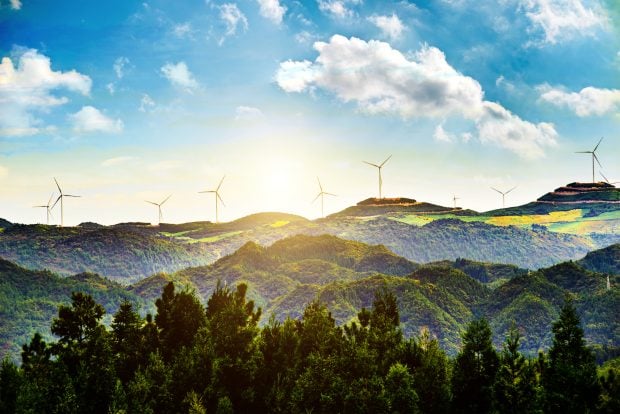Saving people and planet: creating a fairer world in the move to low-carbon economies

As governments focus increasingly on the climate crisis, they must ensure that people and communities are at the centre of policy decisions. At a GGF webinar, Jack Aldane heard experts discuss how to make a just transition and why quality negotiation is key
What is a price worth paying for a sustainable planet? Twenty years ago, this question might have been answered in purely monetary terms but if governments are to effectively tackle climate change, societies are going to go through a paradigm shift that will impact lifestyles as well as livelihoods.
The price of energy transition is going to cost some citizens more than others and increasingly governments realise that decarbonisation without social protections could lead to division, instability, and even civil unrest. This has given rise to the term ‘just transition’, used to describe a shift towards a low carbon economy that protects people’s jobs, health, environment, and assets.
As the panellists of a Global Government Forum webinar made clear, the quality of these transitions depends very much on the quality of the negotiations that get them over the line.
What works for workers
The Just Transition Centre is part of the International Trade Union Confederation (ITUC), a global federation of unions which represent more than 200 million organised workers across 163 countries. Most of its work concentrates on high-emitting sectors and countries, both developed and developing. Like every newly trending term, ‘just transition’ is used more often than it is understood, according to Just Transition Centre director, Samantha Smith.

For unions, Smith explained, the term’s meaning is closely tied to the agreements inscribed in the International Labour Organization (ILO) guidelines. The ILO is a UN body involving governments, employers and workers. In 2015, the ILO negotiated a set of global rules for just transition, which are reflected in the Paris Agreement struck that same year. What these rules emphasise is a need for energy transition that secures decent standards of work and wages for employees.
The fact that such rules exist and are enshrined in historic climate agreements is no small achievement. What really drove that success was the “tripartite social dialogue” between governments, unions and employers, Smith said. “If you don’t have employers and unions at the table negotiating the just transition, then it is actually not a just transition.”
Governments that care about the social as well as environmental outcomes of decarbonisation, therefore, recognise the importance of labour rights. “There is no just transition without labour rights [and] there is no just transition without organised labour,” Smith said.
As director of the climate and sustainability programme at the Overseas Development Institute (ODI), Sarah Colenbrander shares Smith’s view that just transitions only make sense if they protect those most at risk of being left behind “in transit”.

Taking a philosophical stance, she explained how she sees the role of justice in the context of climate action. Environmental sustainability might sound like the one true goal of climate action, she said, but our motives for securing it should include the aspiration for people to flourish in a fairer world. A world that is powered by clean energy is not so much desirable in itself but because it produces clean air for people to breathe. Similarly, energy insecurity is a problem not just because it drives up the cost of living but also because it fuels deadly conflicts and leads to the displacement of innocent people. The dire consequences of fossil fuel dependency are so enormous, Colenbrander said, that it is no longer enough for countries simply to use “new technologies, new systems and processes that emerge in response to the climate crisis”. Governments that really understand the issue must be willing to negotiate with unlikely partners to get results.
“Having a stable, peaceful, and managed transition might demand finding ways to work with those elites who have been barriers to change and to the transition in the past,” she said.
The role of the private sector
Bernhard Lorentz, managing partner and global leader of climate strategy at Deloitte, which supported the webinar, previously served in two administrations in Germany, and has seen discussions about just transitions play an increasing part in boardroom meetings, both in his own country and beyond.
“Global players understand increasingly that there is no way out [of taking] responsibility. We work with clients only when they [recognise just transitions] and the additional aspects of the transformation,” he said. Lorentz’s discussions at last year’s COP26 conference in Glasgow left him sensing that things were broadly “on the right track”, though he said this is especially evident in countries like Germany where union presence is strong.

Sabrina Muller, policy analyst of sustainable finance at the London School of Economics’ (LSE) Grantham Research Institute, noted that governments have a primary responsibility to deliver just transitions but need buy-in from the private sector to do so effectively. Without such buy-in, governments risk shouldering the blame for any stalled progress. By combining technical support, financial incentive and regulatory might, Muller said, governments can steer institutions towards greater advocacy and policy dialogue around energy transition.
Some companies have already stepped up to the challenge. Muller offered examples such as the Scottish energy company SSE, which she said has produced “the first dedicated company just transition plan”. This was drawn up in response to engagement with Royal London Asset Management and the France Provident Foundation and demonstrates a clear link between “a prompt from investors and progress being made by a company in response to that”.
Another example is the Glasgow Financial Alliance for Net Zero, which has more than 450 members and over US$130 trillion of assets under management. Crucially, it has included the just transition in best practice for both real economy and finance sector transition plans.
The financial sector readily recognises the importance of just transition, Muller said. However, the devil is in the details when it comes to turning its supposed commitment into actions. LSE anticipates that this challenge is going to become increasingly relevant over the next couple of years, as businesses and financial institutions develop their climate plans. It is working to provide guidance on what a transition plan that incorporates the social dimension looks like.
“If we managed to anchor the just transition in core guidance with these transition plans, they are bound to be a key tool to invent the just transition in corporate and financial decision-making,” she said.
‘Social sustainability’
The World Bank is one of the most technocratically skilled organisations in the world, though as its global director of social sustainability and inclusion Louise Cord noted, it has grown more and more aware of the importance of social impact to its mission. Offering an alternative to the phrase ‘just transition’, Cord uses the term “social sustainability” to mean “what happens when people feel part of the development or change process and believe that it will benefit them and their descendants”.
The bank’s work in coal mine closures in several countries across Eastern and Central Europe demonstrate why firm agreements between organisations, labour and local communities are the backbone of sustainability.

“We found that the technical challenges of coal mine closures are complex but manageable, but that ignoring the social dimensions can block progress. Moreover, providing subsidies severance payments, cash payments and relocation packages are important, but not sufficient to address the full range of social issues,” Cord said.
To fully understand the challenges, it is crucial to engage early on with communities: not just miners, but also “indirect suppliers, informal workers, non-state actors, the private sector, youth leaders, trade unions, persons with disabilities, women’s groups and indigenous peoples”.
So, one webinar viewer asked, who is going to keep governments accountable for delivering just transitions going forward? For the Just Transition Centre’s Smith, the answer is obvious. Government will be held accountable through the democratic pressures applied by workers’ unions, whether at the ballot box, on the streets, or around the table with employers. Cord agreed, though added that the wider population can also be expected to apply these pressures given their preparedness to protest governments’ inaction on climate change.
Another question put to speakers was whether just transitions, dependent as they are on the participation and consent of so many diverse stakeholders, risk undermining the urgency of the climate crisis.
Cord has heard it said many times that extensive consultation slows everything down. Her experience as former country director at the World Bank, however, suggests the opposite. If you want to put investment to work, she said, nothing helps more than to home in on the social context.

Lorentz said that what is needed from governments is a commitment to speed and scale. “We need to speed up to get things done,” he said, though he added that there can be no just transition without quality outcomes and that everyone brought on board must be able to trust that “there will not be losers” from energy transition.
It is not in the nature of government to produce policy outcomes that please everyone. To enter a negotiation, moreover, is to consent to some degree of compromise, loss, or disappointment. Governments will likely only deliver fair energy transitions if this is first understood as an essential part of the process.
Governments are facing a daunting task if they are to deliver a truly just transition, but the fact that the social aspect of the shift to a low-carbon economy is ascending the political agenda is a positive sign of progress.
The Global Government Forum webinar ‘A just transition: supporting the shift to environmental sustainability’ was held on 26 April, with the support of knowledge partner Deloitte. You can watch the 75-minute webinar via our dedicated event page.






















